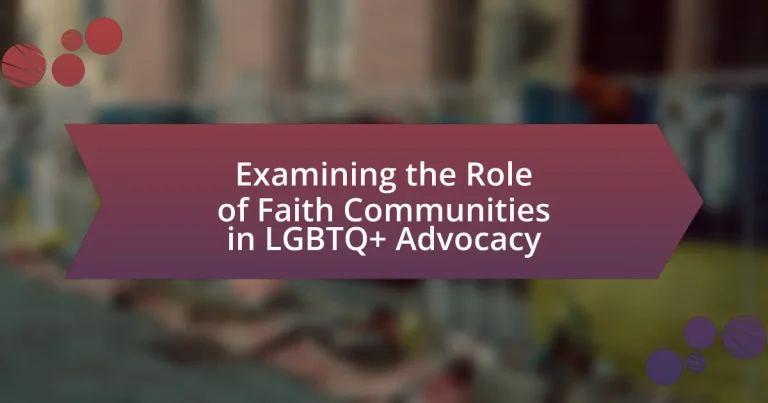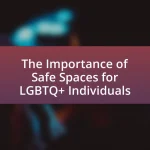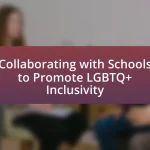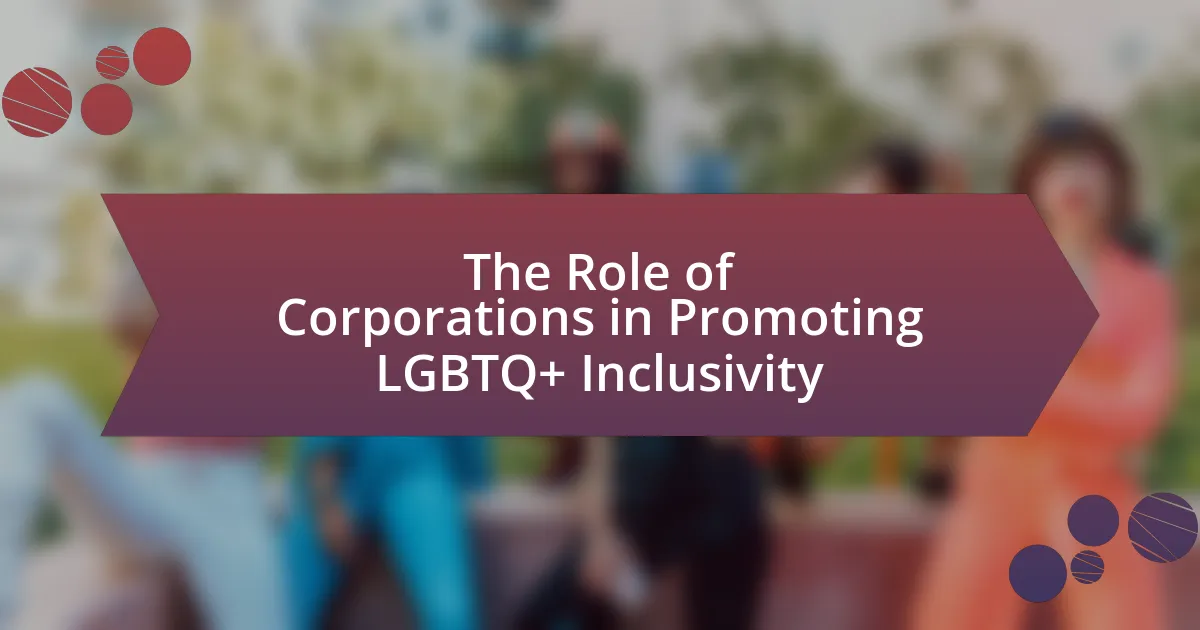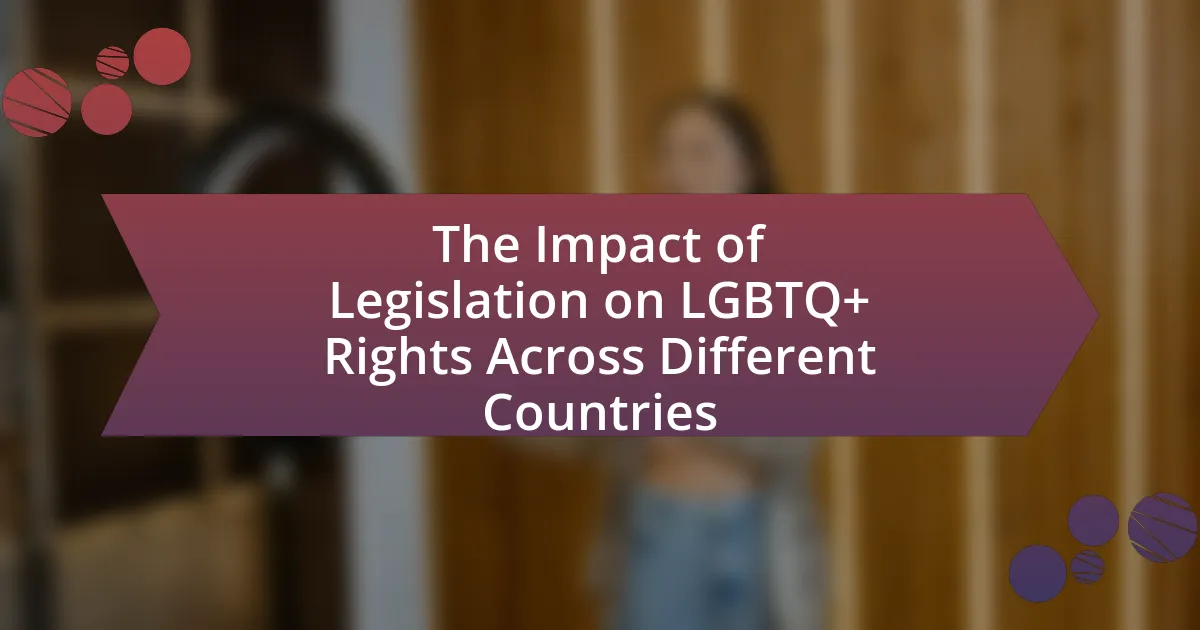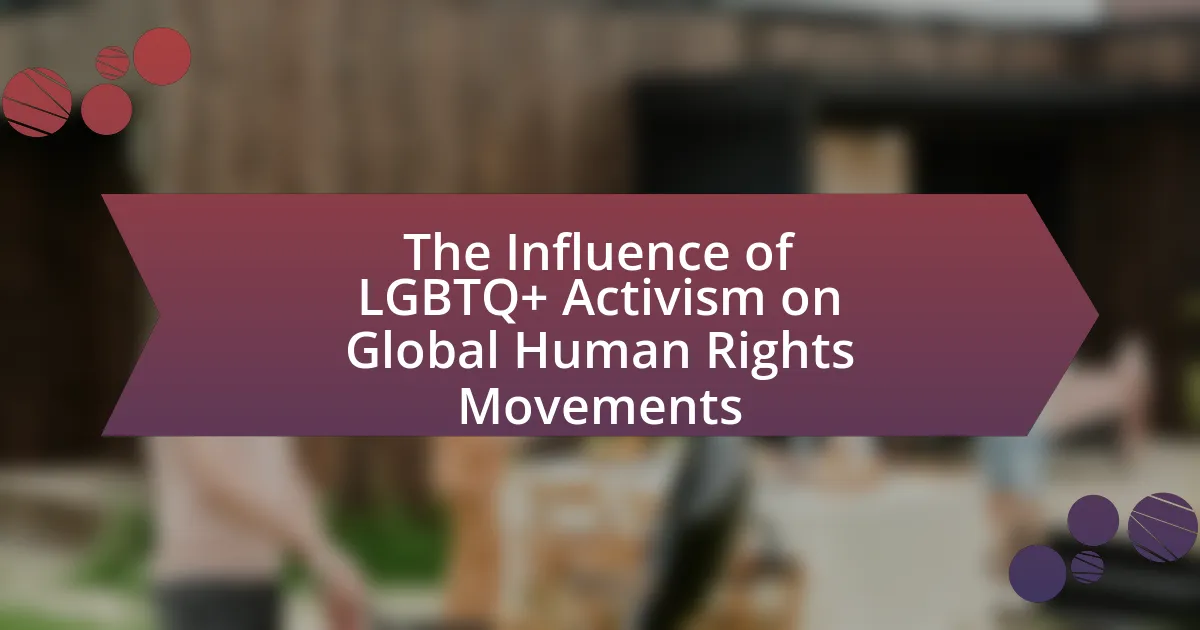The article examines the role of faith communities in LGBTQ+ advocacy, highlighting their significant contributions to support, acceptance, and social justice for LGBTQ+ individuals. It discusses how various faith groups, such as the United Church of Christ and the Episcopal Church, have evolved to embrace LGBTQ+ rights, including same-sex marriage and the ordination of LGBTQ+ clergy. The article also explores historical perspectives, the engagement of different faith traditions, the challenges faced in advocacy, and the impact of societal attitudes and media portrayals on faith communities. Additionally, it outlines strategies for promoting inclusivity and effective advocacy, emphasizing the importance of collaboration with LGBTQ+ organizations and the implementation of educational programs.

What is the Role of Faith Communities in LGBTQ+ Advocacy?
Faith communities play a significant role in LGBTQ+ advocacy by providing support, fostering acceptance, and promoting social justice. Many faith groups have shifted their teachings to embrace LGBTQ+ individuals, advocating for their rights and inclusion within religious spaces. For instance, organizations like the United Church of Christ and the Episcopal Church have publicly supported same-sex marriage and LGBTQ+ rights, demonstrating a commitment to equality. This shift is often rooted in interpretations of religious texts that emphasize love, compassion, and justice, which can counteract discrimination and stigma. Additionally, faith communities often serve as safe havens for LGBTQ+ individuals, offering emotional and spiritual support, which is crucial for mental health and well-being.
How do faith communities engage with LGBTQ+ issues?
Faith communities engage with LGBTQ+ issues through various approaches, including advocacy, inclusion, and dialogue. Many faith groups have begun to affirm LGBTQ+ identities, offering support and acceptance, which is evident in the increasing number of denominations that perform same-sex marriages and ordain LGBTQ+ clergy. For instance, the United Church of Christ and the Episcopal Church have made significant strides in LGBTQ+ inclusion, reflecting a broader trend towards acceptance within religious contexts. Additionally, faith communities often participate in public discussions and initiatives aimed at promoting LGBTQ+ rights, demonstrating their commitment to social justice and equality. This engagement is supported by research indicating that inclusive religious environments can positively impact the mental health and well-being of LGBTQ+ individuals, highlighting the importance of faith communities in fostering acceptance and understanding.
What are the historical perspectives of faith communities on LGBTQ+ rights?
Historically, faith communities have exhibited a range of perspectives on LGBTQ+ rights, often reflecting broader societal attitudes. Many religious groups, particularly conservative denominations, have traditionally opposed LGBTQ+ rights, citing scriptural interpretations that view same-sex relationships as sinful. For instance, the Catholic Church and many evangelical Protestant groups have maintained doctrines that oppose same-sex marriage and LGBTQ+ identities, often leading to exclusion and discrimination against LGBTQ+ individuals.
Conversely, some faith communities have evolved to embrace LGBTQ+ rights, advocating for inclusion and acceptance. Progressive denominations, such as the United Church of Christ and certain branches of Reform Judaism, have actively supported LGBTQ+ rights, including same-sex marriage, reflecting a shift towards more inclusive interpretations of religious texts. This change has been influenced by broader social movements advocating for civil rights and equality, leading to a growing acceptance within these faith communities.
The historical perspectives of faith communities on LGBTQ+ rights illustrate a complex interplay between tradition, interpretation of sacred texts, and evolving societal norms, resulting in both resistance and advocacy for LGBTQ+ individuals within various religious contexts.
How have different faith traditions approached LGBTQ+ advocacy?
Different faith traditions have approached LGBTQ+ advocacy in varied ways, reflecting a spectrum of beliefs and practices. For instance, some denominations within Christianity, such as the United Church of Christ and the Episcopal Church, actively support LGBTQ+ rights, endorsing same-sex marriage and ordaining LGBTQ+ clergy. In contrast, other groups, like the Southern Baptist Convention, maintain traditional views opposing same-sex relationships, often citing scriptural interpretations.
Judaism also exhibits diversity; Reform and Reconstructionist movements advocate for LGBTQ+ inclusion, while Orthodox Judaism generally adheres to more conservative stances. Similarly, within Islam, progressive groups advocate for LGBTQ+ rights, yet many traditional interpretations oppose such advocacy based on religious texts.
This variance illustrates that faith communities are not monolithic; their approaches to LGBTQ+ advocacy are influenced by theological interpretations, cultural contexts, and historical developments.
Why is the involvement of faith communities important in LGBTQ+ advocacy?
The involvement of faith communities is important in LGBTQ+ advocacy because they can provide moral support, foster acceptance, and influence societal attitudes. Faith communities often hold significant cultural and social power, which can help to challenge discrimination and promote inclusivity. For instance, research from the Human Rights Campaign indicates that when faith leaders advocate for LGBTQ+ rights, it can lead to increased acceptance within their congregations and communities. This influence is crucial in shifting public perceptions and creating a more supportive environment for LGBTQ+ individuals.
What impact do faith communities have on public perception of LGBTQ+ issues?
Faith communities significantly influence public perception of LGBTQ+ issues, often shaping attitudes through their teachings and community engagement. Many faith groups promote acceptance and inclusion, which can lead to more positive views on LGBTQ+ rights; for instance, denominations like the United Church of Christ and the Episcopal Church have openly supported LGBTQ+ equality. Conversely, some faith communities uphold traditional beliefs that oppose LGBTQ+ identities, contributing to stigma and discrimination. Research indicates that individuals who engage with affirming faith communities are more likely to support LGBTQ+ rights, highlighting the dual role faith communities play in either fostering acceptance or perpetuating bias.
How can faith communities influence policy changes regarding LGBTQ+ rights?
Faith communities can influence policy changes regarding LGBTQ+ rights by leveraging their moral authority, mobilizing grassroots support, and engaging in advocacy efforts. These communities often have established networks that can effectively communicate messages of inclusion and equality, which can sway public opinion and policymakers. For instance, the United Church of Christ has actively supported marriage equality, demonstrating how religious organizations can align their teachings with progressive social values. Additionally, faith leaders can participate in interfaith coalitions that advocate for LGBTQ+ rights, amplifying their impact through collective action. Research shows that when faith groups publicly support LGBTQ+ rights, it can lead to increased acceptance and legislative changes, as seen in various states where religious endorsements have contributed to the passage of inclusive laws.

What challenges do faith communities face in LGBTQ+ advocacy?
Faith communities face significant challenges in LGBTQ+ advocacy, primarily due to doctrinal beliefs that often oppose LGBTQ+ inclusion. Many religious texts and interpretations promote traditional views on sexuality and gender, leading to resistance within congregations. This resistance can manifest as social stigma, discrimination, and exclusion of LGBTQ+ individuals, which complicates efforts for advocacy and acceptance. Additionally, faith leaders may fear backlash from their communities or loss of membership if they support LGBTQ+ rights, creating a conflict between personal beliefs and congregational expectations. Studies indicate that these doctrinal conflicts can hinder dialogue and understanding, making it difficult for faith communities to engage constructively in LGBTQ+ advocacy.
How do internal beliefs and doctrines affect LGBTQ+ advocacy?
Internal beliefs and doctrines significantly shape LGBTQ+ advocacy by influencing the attitudes and actions of faith communities towards LGBTQ+ individuals. For instance, religious teachings that promote acceptance and love can lead to supportive advocacy efforts, while doctrines that condemn homosexuality may result in opposition to LGBTQ+ rights. A study by the Pew Research Center in 2020 found that 70% of LGBTQ+ individuals reported experiencing rejection from their religious communities, highlighting how negative internal beliefs can hinder advocacy. Conversely, faith groups that embrace inclusive doctrines, such as the United Church of Christ, actively support LGBTQ+ rights, demonstrating how internal beliefs can foster positive advocacy outcomes.
What are the common conflicts between traditional beliefs and LGBTQ+ acceptance?
Common conflicts between traditional beliefs and LGBTQ+ acceptance include differing views on sexuality, gender identity, and marriage. Traditional beliefs often stem from religious doctrines that define heterosexual relationships as the norm, leading to the rejection of LGBTQ+ identities. For instance, many religious texts emphasize procreation within heterosexual marriage, which conflicts with the acceptance of same-sex relationships. Additionally, traditional beliefs may view gender as binary, opposing the recognition of non-binary and transgender identities. This clash is evident in debates over marriage equality and anti-discrimination laws, where faith communities may resist changes that promote LGBTQ+ rights, citing adherence to their interpretations of scripture.
How do faith leaders navigate these conflicts in their communities?
Faith leaders navigate conflicts in their communities by fostering dialogue and promoting understanding among diverse groups. They often engage in open discussions that address differing perspectives, aiming to create a safe space for all voices, particularly those from marginalized communities such as LGBTQ+ individuals. For instance, many faith leaders participate in interfaith panels or community forums that focus on inclusivity and acceptance, which helps to bridge gaps between traditional beliefs and contemporary social issues. Research indicates that faith communities that actively engage in advocacy and education around LGBTQ+ issues can reduce stigma and foster a more inclusive environment, as seen in studies conducted by organizations like the Human Rights Campaign.
What external pressures do faith communities encounter in LGBTQ+ advocacy?
Faith communities encounter significant external pressures in LGBTQ+ advocacy, primarily from societal norms, legal frameworks, and interfaith dynamics. Societal norms often impose traditional views on sexuality and gender, leading to backlash against faith groups that support LGBTQ+ rights. Legal frameworks can create pressure by mandating non-discrimination policies, compelling faith communities to adapt their teachings or practices to comply with laws that may conflict with their beliefs. Additionally, interfaith dynamics can lead to tensions, as differing religious perspectives on LGBTQ+ issues may result in conflict or division within and between faith communities. These pressures can challenge the ability of faith groups to advocate effectively for LGBTQ+ rights while remaining true to their core beliefs.
How do societal attitudes towards LGBTQ+ individuals impact faith communities?
Societal attitudes towards LGBTQ+ individuals significantly impact faith communities by influencing their acceptance, policies, and practices regarding LGBTQ+ members. When societal attitudes are predominantly negative, faith communities often adopt exclusionary stances, leading to discrimination and alienation of LGBTQ+ individuals. For instance, a 2020 survey by the Pew Research Center found that in regions where negative attitudes towards LGBTQ+ individuals are prevalent, religious institutions are more likely to oppose same-sex marriage and LGBTQ+ rights. Conversely, in societies with more accepting views, faith communities tend to embrace inclusivity, fostering supportive environments for LGBTQ+ individuals. This shift can be seen in denominations like the United Church of Christ, which has publicly supported LGBTQ+ rights, reflecting broader societal acceptance. Thus, the interplay between societal attitudes and faith communities shapes the experiences and advocacy efforts of LGBTQ+ individuals within these religious contexts.
What role do media portrayals play in shaping the challenges faced by faith communities?
Media portrayals significantly influence the challenges faced by faith communities by shaping public perceptions and attitudes towards these groups. Negative or stereotypical representations in media can lead to increased discrimination and marginalization of faith communities, particularly those that are more progressive or inclusive regarding LGBTQ+ issues. For instance, studies have shown that media framing often emphasizes conflict between religious beliefs and LGBTQ+ rights, which can exacerbate tensions within communities and hinder dialogue. This framing can also affect how faith communities are perceived by the broader society, leading to challenges in advocacy efforts and community acceptance.

How can faith communities effectively support LGBTQ+ advocacy?
Faith communities can effectively support LGBTQ+ advocacy by promoting inclusivity and acceptance within their congregations. This can be achieved through the implementation of educational programs that address LGBTQ+ issues, fostering dialogue that challenges discrimination, and creating safe spaces for LGBTQ+ individuals. Research indicates that faith-based organizations that actively engage in advocacy can significantly influence public attitudes; for instance, a study by the Human Rights Campaign found that congregations that openly support LGBTQ+ rights contribute to a more accepting community environment. Additionally, faith leaders can publicly affirm LGBTQ+ individuals, participate in pride events, and collaborate with LGBTQ+ organizations to amplify their voices and concerns.
What strategies can faith communities adopt to promote inclusivity?
Faith communities can adopt several strategies to promote inclusivity, including creating safe spaces for LGBTQ+ individuals, implementing inclusive language in worship and teachings, and actively engaging in community outreach programs. Establishing safe spaces allows LGBTQ+ members to express themselves without fear of discrimination, fostering a sense of belonging. Using inclusive language in sermons and religious texts helps to affirm the identities of LGBTQ+ individuals, making them feel recognized and valued within the community. Additionally, participating in outreach programs that support LGBTQ+ rights and issues demonstrates a commitment to social justice and equality, aligning with the core values of many faith traditions. These strategies have been shown to enhance acceptance and understanding, as evidenced by studies indicating that inclusive practices lead to greater participation and satisfaction among diverse congregants.
How can faith communities create safe spaces for LGBTQ+ individuals?
Faith communities can create safe spaces for LGBTQ+ individuals by actively promoting inclusivity and acceptance through education, dialogue, and supportive policies. By implementing training programs that educate members about LGBTQ+ issues and fostering open discussions, faith communities can challenge prejudices and misconceptions. Research indicates that congregations that adopt affirming policies, such as inclusive language in worship and support groups for LGBTQ+ individuals, significantly enhance feelings of safety and belonging among LGBTQ+ members. For instance, a study by the Human Rights Campaign found that faith communities that publicly affirm LGBTQ+ identities report higher levels of participation and satisfaction among LGBTQ+ congregants.
What educational programs can be implemented to foster understanding and acceptance?
Educational programs that can be implemented to foster understanding and acceptance include diversity training workshops, inclusive curriculum development, and community dialogue initiatives. Diversity training workshops educate participants about LGBTQ+ issues, promoting empathy and reducing prejudice. Inclusive curriculum development integrates LGBTQ+ history and contributions into educational materials, ensuring representation and fostering a sense of belonging. Community dialogue initiatives create safe spaces for open discussions between faith communities and LGBTQ+ individuals, facilitating mutual understanding and respect. Research shows that such programs can significantly improve attitudes towards LGBTQ+ individuals, as evidenced by studies indicating that exposure to inclusive education reduces homophobic attitudes among participants.
What partnerships can faith communities form to enhance their advocacy efforts?
Faith communities can enhance their advocacy efforts by forming partnerships with LGBTQ+ organizations, social justice groups, and local government agencies. Collaborating with LGBTQ+ organizations allows faith communities to gain insights into the specific needs and challenges faced by LGBTQ+ individuals, fostering a more informed and empathetic approach to advocacy. Partnering with social justice groups can amplify their voices and broaden the reach of their initiatives, as these groups often have established networks and resources dedicated to promoting equality and inclusion. Additionally, engaging with local government agencies can facilitate access to policy-making processes, enabling faith communities to advocate for legislative changes that support LGBTQ+ rights. These partnerships are essential for creating a united front in the fight for equality and social justice.
How can collaboration with LGBTQ+ organizations strengthen advocacy initiatives?
Collaboration with LGBTQ+ organizations can strengthen advocacy initiatives by leveraging their expertise, networks, and resources to create more effective campaigns. LGBTQ+ organizations possess deep knowledge of the specific challenges faced by the community, which can inform advocacy strategies and ensure that initiatives are relevant and impactful. For instance, partnerships can enhance outreach efforts, as organizations often have established relationships with community members, allowing for better engagement and mobilization. Additionally, data from the Human Rights Campaign indicates that inclusive advocacy efforts lead to more comprehensive policy changes, demonstrating that collaboration can result in tangible improvements in rights and protections for LGBTQ+ individuals.
What role do interfaith dialogues play in promoting LGBTQ+ rights?
Interfaith dialogues play a crucial role in promoting LGBTQ+ rights by fostering understanding and acceptance among diverse religious communities. These dialogues create a platform for individuals from different faith backgrounds to discuss and challenge traditional beliefs that may marginalize LGBTQ+ individuals. For instance, initiatives like the Interfaith Alliance have successfully brought together leaders from various religions to advocate for LGBTQ+ equality, emphasizing shared values of love and justice. Research indicates that such dialogues can lead to significant shifts in attitudes, as seen in the 2015 Pew Research Center study, which found that interfaith discussions often result in increased support for LGBTQ+ rights among participants.
What are some best practices for faith communities in LGBTQ+ advocacy?
Faith communities can effectively advocate for LGBTQ+ rights by implementing inclusive policies, fostering open dialogue, and providing education on LGBTQ+ issues. Inclusive policies, such as affirming same-sex relationships and gender identity, create a welcoming environment, as evidenced by congregations that have adopted such measures reporting increased participation from LGBTQ+ individuals. Open dialogue encourages understanding and acceptance, with studies showing that conversations about LGBTQ+ experiences within faith settings reduce stigma and promote empathy. Additionally, educational programs that inform members about LGBTQ+ history and rights can enhance awareness and support, as demonstrated by initiatives in various faith organizations that have led to greater allyship and advocacy efforts.
How can faith communities measure the effectiveness of their advocacy efforts?
Faith communities can measure the effectiveness of their advocacy efforts by evaluating specific outcomes such as changes in policy, increased awareness, and community engagement. For instance, they can track legislative changes that align with their advocacy goals, such as the passage of LGBTQ+ rights laws, which can be quantified through legislative records. Additionally, surveys and feedback from community members can provide insights into shifts in public perception and awareness regarding LGBTQ+ issues, demonstrating the impact of advocacy campaigns. Furthermore, participation rates in events and initiatives organized by faith communities can serve as indicators of engagement and support for LGBTQ+ advocacy, reflecting the community’s responsiveness to these efforts.
What resources are available for faith communities to support LGBTQ+ advocacy?
Faith communities can access various resources to support LGBTQ+ advocacy, including organizations like the Human Rights Campaign, which provides educational materials and training programs tailored for faith leaders. Additionally, the Interfaith Alliance offers resources that promote inclusivity and understanding within religious contexts. The United Church of Christ has developed specific guidelines and resources for congregations to affirm LGBTQ+ individuals, demonstrating a commitment to advocacy. Furthermore, local LGBTQ+ centers often collaborate with faith communities to provide workshops and support networks, fostering a more inclusive environment. These resources collectively empower faith communities to engage in meaningful advocacy for LGBTQ+ rights and acceptance.
